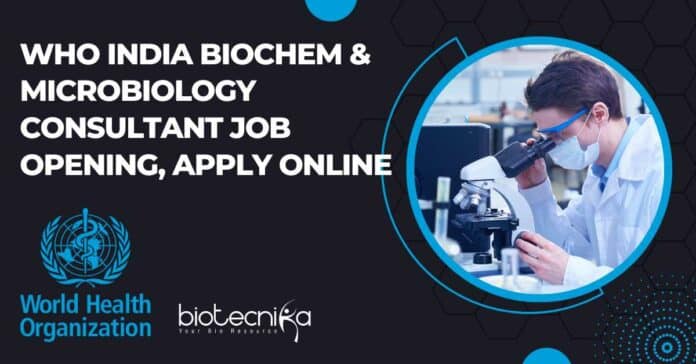WHO India Biochem & Microbiology Consultant Job Opening, Apply Online
WHO India Biochem & Microbiology Consultant Job Opening, Apply Online. WHO India job openings. MSc Biochem and Microbiology job openings. WHO India Biochem & Microbiology Consultant Job. Interested and eligible applicants can check out all of the details on the same below
Hey there if you are looking for some assistance with the possibilities of the interview questions and answers then check below
International consultant for small National Regulatory Authorities (NRAs) – (2304236)
Contractual Arrangement: External consultant
Contract Duration (Years, Months, Days): 6 Months
Job Posting: May 16, 2023, 10:01:33 AM
Closing Date: May 30, 2023, 3:29:00 AM
Primary Location: India
Organization: SE/HSD Department of Health Systems Development
Schedule: Part-time
Purpose of consultancy
One of the key pivotal roles of WHO is supporting countries in strengthening their regulatory systems, and promoting equitable access to quality, safe, efficacious, and affordable medical products. These activities are supported by the Global Benchmarking Tool (GBT), which allows WHO to objectively evaluates regulatory systems, as mandated by WHA Resolution 67.20 on Regulatory System Strengthening for medical products.
The Medical Products Regulation Unit under the Health Systems Development department, WHO SEARO intends to characterize the specificities
of less-resourced National Regulatory Authorities (NRAs) for three prioritized regulatory functions, develop a model to strengthen these functions, and to provide recommendations on how to implement this model to the participating Member States.During a regional consultation, the five concerned Member States requested to prioritize Marketing Authorizations, Market surveillance and control, and Regulatory Inspections. While the analysis will focus on these regulatory functions, it should also consider key determinant beyond the strict perimeter of these regulatory functions and the NRA. The scope is limited to medicines and vaccines regulation.
A first phase of the work will be based on the experience accumulated by WHO in these countries, including through previous self-benchmarking and benchmarking exercises. This initial status will be refined with interviews with key informants from NRAs and other relevant stakeholders in the participating countries (e.g. Ministry of Health, Procurement Agency, Professional associations of pharmacists, importers, regional/international association of manufacturers, etc.). The accumulated experience will be summarized during this phase and will be the basis for the next phase.
In collaboration with National Regulatory Authorities and WHO, the consultant will identify and/or develop solutions for less-resourced National Regulatory Authorities for each prioritized regulatory functions, also considering the global benchmarking tool and how to interpret key sub-indicators in such context. These solutions should also consider whether the country has a local production. The output should be presented in a manner that can be easily understood and implemented by authorities with limited human resources (e.g. flow chart, step-by-step guide, etc.). The draft will be further discussed in a regional workshop.
Finally, the experts will provide support to each participating country in implementing these solutions in relation with their institutional development plan, and further collect information on any remaining challenge to refine the proposed solutions. The proposed solutions to the specific needs of less-resourced National Regulatory Authorities will be refined based on the experience accumulated during the implementation phase. The proposed model could be tested with one or a small number of products to ensure feasibility and refine the system.
Background
The benchmarking activities organized in the region have shown that less-resourced NRAs face specific challenges which are different from other Member States. These challenges include multi-tasking staff, limited resources (settings, financial, IT, etc), acute tensions between quality and access, importation of a large share of the medical products, less resourced marketing authorization holders (sometimes private pharmacies, often importers), and little authority on international manufacturing companies.
The assessment of the regulatory systems in these countries have shown that while the GBT remains relevant in such context, their situation calls for particular solutions which includes giving further consideration to apply risk-based smart regulatory approaches in the form of staged or stepwise implementation – from basic to expanded regulatory controls – prioritization of activities, use of external experts, or a large use of reliance at the international and national levels.
While half of the WHO Member States have 10 millions or less inhabitants, the guidelines available to support less-resourced NRAs are limited.
Deliverables
- Deliverable 1: Zero draft model of regulatory system for the prioritised functions, to be discussed with key informants.
- Deliverable 2: Refined draft model following discussions with the key informants and regional workshop.
- Deliverable 3: Commented CAPA plan for each of the 5 participating NRA and finalized model.
Qualifications, experience, skills and languages
Educational Qualifications:
Essential:
- University degree in pharmacy, medicine, pharmacology, chemistry, biochemistry, microbiology, or other health related sciences.
- Postgraduate degree in pharmacy, medicine, public health or any of the above sciences or management.
Experience
Essential:
- At least ten years of national, regional or international professional experience working in the area of regulation of medical products within the national or regional regulatory authority and/or pharmaceutical industry.
- Experience of working in collaboration with the World Health Organization is essential in order to understand WHO’s roles and core functions.
- Experience related to benchmarking of regulatory authorities in low- and middle-income countries (LMICs).
Desirable: Experience related to benchmarking of small regulatory authorities in low- and middle-income countries (LMICs) in the region.
Skills/Knowledge:
Extensive knowledge of regulatory systems strengthening for medical products in the regulatory authority or related fields and in-depth knowledge of the WHO global benchmarking tool, methodology and related guidelines. Excellent ability to communicate and work in diverse cultural settings. Good professional drafting and communication skills.
Use of Language Skills: Excellent knowledge of English.
Location
- On-site: Regional workshop to discuss the draft model in one of the participating Member States.
- Off-site: Home-based (virtual).
WHO India Biochem & Microbiology Consultant Job
Travel
One travel for a three-day regional workshop to discuss the draft model with the Member States (place to be confirmed), tentatively 5-7 September.
Remuneration:
- Remuneration: Band Level-C;
- Daily remuneration starting from USD 500 to USD 625.
- Monthly remuneration starting from USD 10,000 to USD 12,500.
- Living expenses: Per diem will be paid as per WHO rules applicable to international consultant for travel
- Expected duration of contract: 6 months (part time)
Additional Information
- This Vacancy Notice may be used to fill similar positions at the same level.
- Only candidates under serious consideration will be contacted.
- A written test / and or a presentation, along with interview will be used as a form of screening.
- WHO is committed to workforce diversity.
- WHO prides itself on a workforce that adheres to the highest ethical and professional standards and that is committed to put the WHO Values Charter into practice.
- WHO has a smoke-free environment and does not recruit smokers or users of any form of tobacco.
- This post is subject to local recruitment and will be filled by persons recruited in the local commuting area of the duty station.
- In the event that your candidature is retained for an interview, you will be required to provide, in advance, a scanned copy of the degree(s)/diploma(s)/certificate(s) required for this position. WHO only considers higher educational qualifications obtained from an institution accredited/recognized in the World Higher Education Database (WHED), a list updated by the International Association of Universities (IAU)/United Nations Educational, Scientific and Cultural Organization (UNESCO). The list can be accessed through the link: http://www.whed.net/. Some professional certificates may not appear in the WHED and will require individual review.
- For information on WHO’s operations please visit: http://www.who.int.
- WHO has zero tolerance towards sexual exploitation and abuse (SEA), sexual harassment and other types of abusive conduct (i.e., discrimination, abuse of authority and harassment). All members of the WHO workforce have a role to play in promoting a safe and respectful workplace and should report to WHO any actual or suspected cases of SEA, sexual harassment and other types of abusive conduct. To ensure that individuals with a substantiated history of SEA, sexual harassment or other types of abusive conduct are not hired by the Organization, WHO will conduct a background verification of final candidates.
- Any extension of appointment would be subject to programmatic requirements, performance of the incumbent and availability of funds.
- Qualified female candidates are encouraged to apply.
Hey there if you are looking for some assistance with the possibilities of the interview questions and answers then check below
- Can you share your experience in working with national or regional regulatory authorities in the field of medical product regulation?
- Answer: Yes, I have over ten years of professional experience working in the regulation of medical products within regulatory authorities and the pharmaceutical industry. I have collaborated with various national and regional regulatory authorities, gaining extensive knowledge of regulatory systems and their strengthening.
- Have you been involved in benchmarking activities for regulatory authorities in low- and middle-income countries (LMICs)? If yes, could you provide an example and the outcomes?
- Answer: Yes, I have experience in benchmarking regulatory authorities in LMICs. For instance, I worked on a benchmarking project where we assessed the regulatory systems of several LMICs, identifying specific challenges and recommending solutions to strengthen their regulatory functions. The outcomes of the project included prioritized activities, risk-based regulatory approaches, and the use of external experts to enhance regulatory controls.
- How familiar are you with the WHO Global Benchmarking Tool (GBT) and its guidelines? Can you explain how you have utilized it in your previous work?
- Answer: I have extensive knowledge of the WHO GBT and its guidelines. In my previous work, I have utilized the GBT to objectively evaluate regulatory systems, assess their performance, and identify areas for improvement. By using the GBT, I was able to provide recommendations for strengthening regulatory functions based on key sub-indicators and interpreting them within specific contexts.
- Can you describe your experience in developing regulatory models and solutions for less-resourced national regulatory authorities? How did you ensure that these models were easily implementable for authorities with limited resources?
- Answer: I have successfully developed regulatory models and solutions for less-resourced national regulatory authorities. To ensure their implementability, I have used approaches such as creating flow charts, step-by-step guides, and other user-friendly formats. These materials were designed specifically for authorities with limited human resources, allowing them to easily understand and implement the proposed solutions.
- Have you worked on projects involving regional workshops and consultations with key informants? How did you effectively collaborate with stakeholders and gather valuable insights during these interactions?
- Answer: Yes, I have organized regional workshops and conducted consultations with key informants in the past. To ensure effective collaboration, I employed a participatory approach, actively engaging stakeholders from national regulatory authorities, Ministries of Health, procurement agencies, professional associations, and other relevant organizations. By facilitating open discussions and interviews, I gathered valuable insights and incorporated them into the development of regulatory models and solutions.
Please note that these are sample interview questions and the answers provided are general suggestions. It is recommended to tailor the responses to your specific experiences and expertise.
Editor’s Note: WHO India Biochem & Microbiology Consultant Job Opening, Apply Online. WHO India Biochem & Microbiology Consultant Job. WHO India Biochem & Microbiology Consultant Job. Please ensure that you are subscribed to the Biotecnika Times Newsletter and our YouTube channel to be notified of the latest industry news. Follow us on social media like Twitter, Telegram, Facebook































